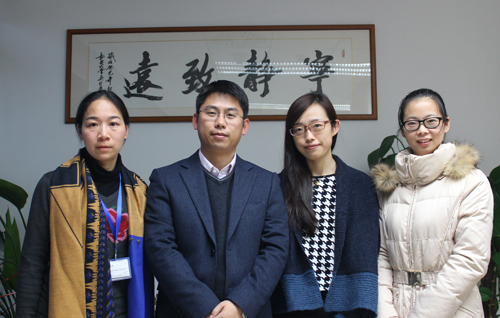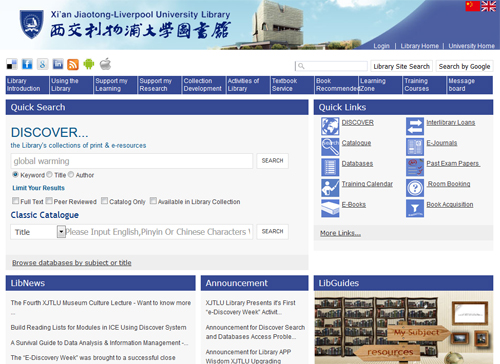
Overview
Founded in 2006 by Xi’an Jiaotong University in China and the UK’s University of Liverpool, Xi’an Jiaotong-Liverpool University (XJTLU) is an independent Sino-Foreign cooperative university and is the first and only one of its kind recognized by China’s Ministry of Education.
In 2012, the XJTLU Library became one of the first institutions in China to evaluate discovery solutions. The Library ultimately chose EBSCO Discovery Service™ (EDS), a powerful research tool that enables users to search across the majority of an institution’s holdings at once. In addition, the Library subscribed to a number of full-text databases and e-journals through EBSCO. With more than 2.7 million e-books and 105 electronic databases available to its 9,000 students and faculty, the XJTLU Library is better positioned to support academic research.
In 2015, to more tightly integrate library resources with the University’s learning management system, the Library embedded EBSCO’s Curriculum Builder LMS plug-in. Now professors can easily pull in the library’s subscription content from EDS into Moodle to create their course reading lists.
[EDS] has been a great research and learning partner for staff and students.
[EDS] has been a great research and learning partner for staff and students.
Challenges
Before 2010, the Library offered only two databases ― Duxiu (with interlibrary service) and Emerald Management Xtra 200. According to Liping Yang, Team Leader of the Academic Liaison and Reference Division (ALRD), the Library was initially focused on teaching support. However, as the University established new academic programmes, the number of students needing research support also increased.
When XJTLU was granted degree-awarding power by China’s Ministry of Education in 2010, University Librarian Dr. Xin Bi shifted the Library’s strategy to focus not only on teaching support, but also research support. Bi asked the ALRD to look for ways to increase the number of available resources “at users’ fingertips” while improving the search experience.
“We began to frame the development structure of our digital library by following the latest development trends of other top university libraries around the world,” Yang explained, adding that she and her colleagues determined that a discovery service would enable them to integrate their growing number of databases.
Solutions
Evaluation
Yang formed a small evaluation committee that included herself, the senior cataloging librarian, and the library systems officer. As the Secretary of the University Library Affairs Committee, Yang was also able to regularly consult with representatives from each academic department.
The library trialed EBSCO Discovery Service (EDS) and Summon by Serial Solutions and evaluated several factors including ease of use, quality of metadata, reporting, and relevance ranking.
“After observing our users’ behavior, we found that the most critical evaluation factor for a discovery service is relevance ranking, showing the most relevant records on the top of the first page of search results,” Yang said. “EDS was the superior product in this regard.”
The library purchased EDS in April 2012 and officially launched the tool as “DISCOVER” in September 2012.

Customisation & Branding
An EDS search box displays prominently on the home page of the library website. Radio buttons allow users to search by keyword, title or author. Additional limiters, such as the peer reviewed limiter, allow users to further narrow their searches.
The library chose to default DISCOVER search results to Available in Library Collection. “Our users prefer getting full text rather than the abstract,” Yang explained. The library has also embedded its Document Delivery Service in EDS, so enabling the Available in Library Collection limiter was a way to prevent the library from exhausting its Inter-Library Loan budget.

In addition, the library uses the Curriculum Builder LMS plug-in, which integrates with Moodle, the University’s learning management system. This plug-in enables lecturers to search EDS and create customised reading lists from within their course modules.
“Curriculum Builder helps to connect Moodle and the Library together,” said Yang, adding that EBSCO’s Discovery Solutions Engineer in China was instrumental in making Curriculum Builder for Moodle work for their custom environment and access needs. “EDS and Curriculum Builder work well together. It will surely improve the usage of library resources as almost every student uses Moodle every day.”
Promotion & Training
In October 2015, the library organized “eDiscovery Week,” an event aimed at enhancing student and staff awareness of the library’s digital resources. The event included training workshops, demonstrations and a contest. The library created an infographic poster to show users’ searching behavior. They also produced a video on digital library use that explains why DISCOVER is an important tool.
“It is our main job to train users of XJTLU on how to use the library and enhance their information skills,” Yang said, adding that librarians also collaborate with academic departments to embed training sessions into their course modules. “DISCOVER is the essential content in our training sessions,” she said. “It has turned out to be very popular among undergraduate students.”
Benefits & Results
Since launching EDS, the library has seen a notable increase in the use of its resources. In 2015, DISCOVER users downloaded nearly 180,000 full-text articles, up 23 percent from 2014. Peak usage occurred in March and October.
Meanwhile, library trainings are easier since librarians no longer have to demonstrate multiple databases. Yang said both students and faculty are experiencing fewer frustrations and more success.
“We received positive feedback about DISCOVER from our users,” she said. “It has been a great research and learning partner for staff and students.”
Yang also praised the “openness” of EBSCO, citing the EDS Content Update emails and the EDS Wiki as ways to stay apprised of the latest content, features and API technology.
“It is very important for us to catch these shared applications and apply them in our own service,” Yang said.
Ultimately, DISCOVER is meeting the single-search expectations of users and surfacing more of the library’s content. “It has been especially helpful for undergraduate students who may not be aware of which databases to choose,” Yang said. “EDS brings search results with full text directly [to them] which meets their needs for resources effectively.”